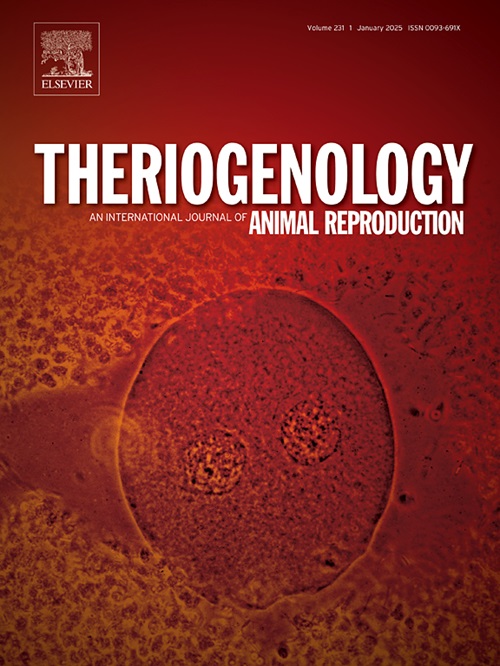MiR-214通过靶向TRAF1抑制NF-κB通路激活,缓解脂多糖诱导的乳腺炎
IF 2.4
2区 农林科学
Q3 REPRODUCTIVE BIOLOGY
引用次数: 0
摘要
乳腺炎是指奶牛乳腺组织的炎症,是乳品行业面临的一个重大挑战。microRNA miR-214被认为是在炎症性疾病中起关键作用的关键内源性调节分子。然而,它在乳腺炎的调节中所起的作用尚不清楚。本研究探讨了miR-214在乳性乳腺炎中的作用,并探讨了其治疗潜力。在体内脂多糖(LPS)诱导的小鼠乳腺炎模型和体外脂多糖诱导的牛乳腺上皮细胞(bMEC)炎症模型中,miR-214的表达降低。miR-214模拟物被发现抑制炎症细胞因子IL-1β、TNF-α和IL-6的表达。此外,miR-214模拟物抑制了lps诱导的bmec中核因子-κB (NF-κB)途径的激活。双荧光素酶报告基因检测结果证实,miR-214靶向肿瘤坏死因子受体相关因子1 (TRAF1)抑制其表达。在bmec中沉默TRAF1可降低lps诱导的炎症细胞因子表达和NF-κB通路激活。相反,TRAF1过表达否定了miR-214对脂多糖诱导的炎症细胞因子表达和NF-κB通路激活的抑制作用。此外,在体内lps诱导的小鼠乳腺炎模型中,miR-214减轻了乳腺组织的病理损伤,降低了炎症细胞因子的表达。这些发现表明,miR-214通过下调TRAF1表达抑制NF-κB活化,从而减轻lps诱导的炎症反应。本研究强调了一种潜在的治疗奶牛乳腺炎的新方法。本文章由计算机程序翻译,如有差异,请以英文原文为准。

MiR-214 inhibits NF-κB pathway activation to alleviate lipopolysaccharide-induced mastitis by targeting TRAF1
Mastitis in dairy cows is defined by inflammation of mammary tissue, and represents a significant challenge in the dairy industry. The microRNA miR-214 is recognized as a key endogenous regulatory molecule with a critical role in inflammatory diseases. However, its involvement in the regulation of mastitis remains unclear. This study, investigated the role of miR-214 in dairy mastitis and explored its therapeutic potential. It was observed that miR-214 expression was reduced in an in vivo lipopolysaccharide (LPS)-induced mouse mastitis model and an in vitro LPS-induced bovine mammary epithelial cell (bMEC) inflammation model. The miR-214 mimic was found to suppress the expression of inflammatory cytokines IL-1β, TNF-α, and IL-6. Furthermore, the miR-214 mimic inhibited nuclear factor-κB (NF-κB) pathway activation in LPS-induced bMECs. Dual‐luciferase reporter assay results confirmed that miR-214 targeted tumor necrosis factor receptor-associated factor 1 (TRAF1) to inhibit its expression. Silencing TRAF1 in bMECs reduced LPS-induced expression of inflammatory cytokines and NF-κB pathway activation. Conversely, TRAF1 overexpression negated the inhibitory effects of miR-214 on LPS-induced inflammatory cytokines expression and NF-κB pathway activation in bMECs. Additionally, in the in vivo LPS-induced mouse mastitis model, miR-214 alleviated pathological damage and decreased inflammatory cytokines expression in mammary tissue. These findings suggest that miR-214 inhibits NF-κB activation by downregulating TRAF1 expression thereby mitigating LPS-induced inflammatory responses. This study highlights a potential novel approach for the treatment of mastitis in dairy cows.
求助全文
通过发布文献求助,成功后即可免费获取论文全文。
去求助
来源期刊

Theriogenology
农林科学-生殖生物学
CiteScore
5.50
自引率
14.30%
发文量
387
审稿时长
72 days
期刊介绍:
Theriogenology provides an international forum for researchers, clinicians, and industry professionals in animal reproductive biology. This acclaimed journal publishes articles on a wide range of topics in reproductive and developmental biology, of domestic mammal, avian, and aquatic species as well as wild species which are the object of veterinary care in research or conservation programs.
 求助内容:
求助内容: 应助结果提醒方式:
应助结果提醒方式:


